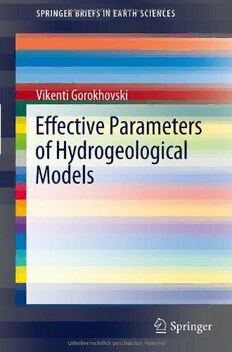Download Effective Parameters of Hydrogeological Models PDF Free - Full Version
Download Effective Parameters of Hydrogeological Models by Vikenti Gorokhovski (auth.) in PDF format completely FREE. No registration required, no payment needed. Get instant access to this valuable resource on PDFdrive.to!
About Effective Parameters of Hydrogeological Models
Models of geological objects are tools for interpolation and extrapolation of available data in space and time continuously. Real structures of the objects are unknown, and their models and simulated results carry uncertainty which cannot be evaluated in a provable way. The real issue is obtaining effective predictions in a reasonably defined sense. This requires a knowledge of mechanisms that convert actual geological properties into effective model parameters. These mechanisms are introduced in the book. They reveal that effective parameters are not statistics but characteristics optimizing the system made up by geological surroundings, their models, predictive problem formulations, including mathematical models of the simulated processes, boundary conditions, monitoring networks, criteria of efficiency and even by time. Examples of evaluating and applying transformation for assigning effective parameters and solving inverse problems are presented.
Detailed Information
| Author: | Vikenti Gorokhovski (auth.) |
|---|---|
| Publication Year: | 2012 |
| ISBN: | 9783642237218 |
| Pages: | 168 |
| Language: | English |
| File Size: | 2.361 |
| Format: | |
| Price: | FREE |
Safe & Secure Download - No registration required
Why Choose PDFdrive for Your Free Effective Parameters of Hydrogeological Models Download?
- 100% Free: No hidden fees or subscriptions required for one book every day.
- No Registration: Immediate access is available without creating accounts for one book every day.
- Safe and Secure: Clean downloads without malware or viruses
- Multiple Formats: PDF, MOBI, Mpub,... optimized for all devices
- Educational Resource: Supporting knowledge sharing and learning
Frequently Asked Questions
Is it really free to download Effective Parameters of Hydrogeological Models PDF?
Yes, on https://PDFdrive.to you can download Effective Parameters of Hydrogeological Models by Vikenti Gorokhovski (auth.) completely free. We don't require any payment, subscription, or registration to access this PDF file. For 3 books every day.
How can I read Effective Parameters of Hydrogeological Models on my mobile device?
After downloading Effective Parameters of Hydrogeological Models PDF, you can open it with any PDF reader app on your phone or tablet. We recommend using Adobe Acrobat Reader, Apple Books, or Google Play Books for the best reading experience.
Is this the full version of Effective Parameters of Hydrogeological Models?
Yes, this is the complete PDF version of Effective Parameters of Hydrogeological Models by Vikenti Gorokhovski (auth.). You will be able to read the entire content as in the printed version without missing any pages.
Is it legal to download Effective Parameters of Hydrogeological Models PDF for free?
https://PDFdrive.to provides links to free educational resources available online. We do not store any files on our servers. Please be aware of copyright laws in your country before downloading.
The materials shared are intended for research, educational, and personal use in accordance with fair use principles.

